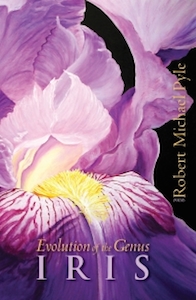For as many books as Robert Michael Pyle has written, for all the poems of his I’ve read in various periodicals – as well as those I’ve heard him weave into the many talks I’ve heard him deliver, I was astonished to learn that until the publication of Evolution of the Genus Iris his name had not graced the cover of a book dedicated entirely to his poems. Not that he hasn’t written sufficient verses to fill an entire bookshelf with such tomes… Indeed, many – including myself – would argue that his prose often approaches poetry in its lyrical playfulness.
Nevertheless, now that he has collected a selection of his poems into a single volume, and Lost Horse Press has wisely decided to bring it into print, it falls to the likes of humble reviewers such as myself to write something about it so that you dear reader might learn if it is worth you time and eighteen U.S. dollars (twenty-one of the Canadian variety) to read. Cutting right to the chase, it is. For those who might wish to know why, I’ll continue.
Despite having taken a degree in English literature, I no longer very often find myself reading verse. Part of the reason for this is that as a specialist reviewer of books of natural history, it’s all I can do to keep up with my reading of all the new and worthy titles of that genre so as to keep the stream of reviews flowing. Part is also due to the fact that my taste in verse tends toward what I cut my literary teeth upon – particularly the highly structured poetry of such Eighteen Century worthies as Pope an Swift. Thus the free and unstructured forms of much, if not most modern poetry, leaves me cold.
Which is why it was with some hesitation that I picked up Bob’s (full disclosure – I live across the river from him and our paths have crossed more than a sufficient number of times for such familiarity to be appropriate) new Iris to read. I had a strong hunch from all the previous poems of his that I’ve read and heard what styles he would have used in these collected verses, and I knew that whereas I have indeed always enjoyed his poems when I have heard them delivered in his own voice, that in print they might lose their charm, and so much free verse en masse might become tiresome. For the book to “win me over” it would have to do double duty – catch my interest with its content as well as overcome my trepidation regarding free verse poems.
Needless to say, it did both. Far from the pedantic and needlessly cryptic verse of all-too-many modern poets writing in English today, the verses included in Bob’s Iris dance and sing for all to enjoy. Far from being a poet of the academy, Bob is – just as he is as a writer of prose – a poet of and for the people. Just as he himself knows no strangers, so his poems are likewise friends to all as well. For example, the opening stanza of his “Releasing the Horseflies:”
Everyday I visit the half-screened
back porch to let the horseflies
out. Smart enough to get in,
too dumb to get out, they wham!
against the rusty screen
all day long.
Nothing hidden here; no inside “Oo aren’t I a clever boy!” allusions that only the academic cognoscenti may catch. It’s simply the honest and straight-forward report of an otherwise mundane daily activity, given meaning simply by its being observed, recorded, and reflected upon (“And, oh! their stripéd silken eyes / are beautiful”).
As might be expected from such an accomplished naturalist as Bob, images of nature richly adorn the vast majority of the poems. From cherry blossoms and earthworms to Horseshoe Crabs and his much-beloved butterflies, the imagery of the Iris poems is deeply earthy in a way that only one thoroughly familiar with the ways of the natural world could compose. Many contemporary poets often include imagery of nature in their respective works, but with Bob, the myriad wonders of nature are as much a part of his everyday language as nouns and verbs – without them I do not believe he would be capable of communication at all – and as a result they flow as gracefully through the verses as swallows fly through a summer evening.
But not all is sunshine and brightness in this book. The pain of losing his beloved wife Thea, to whom the book is dedicated and about whom both the first poem and the final line of the book directly addresses, has left a unmissable scar upon Bob. While the previously mentioned “Garden Catalog” speaks to her in words of love and admiration, other poems – “Cancer Incantation” particularly – are filled with all-too-tangible pain. Yet even from loss and grief, hope is still declared to be possible through understanding, as is so eloquently declared by the final line of “Notes from the Edge of the Known World:”
Until you think of this great ape,
the one that stands upright and poses every question ever asked,
in such a world where everything that grows breaks down
and down, and down, then grows, and grows and grows,
and grows again.
Further elaboration is not needed.
 Title: Evolution of the Genus Iris
Title: Evolution of the Genus Iris
Author: Robert Michael Pyle
Publisher: Lost Horse Press
ISBN: 9780991146543
Pages: 88
Date: April 2014
In accordance with Federal Trade Commission 16 CFR Part 255, it is disclosed that the copy of the book read in order to produce this review was provided gratis to the reviewer by the publisher.
